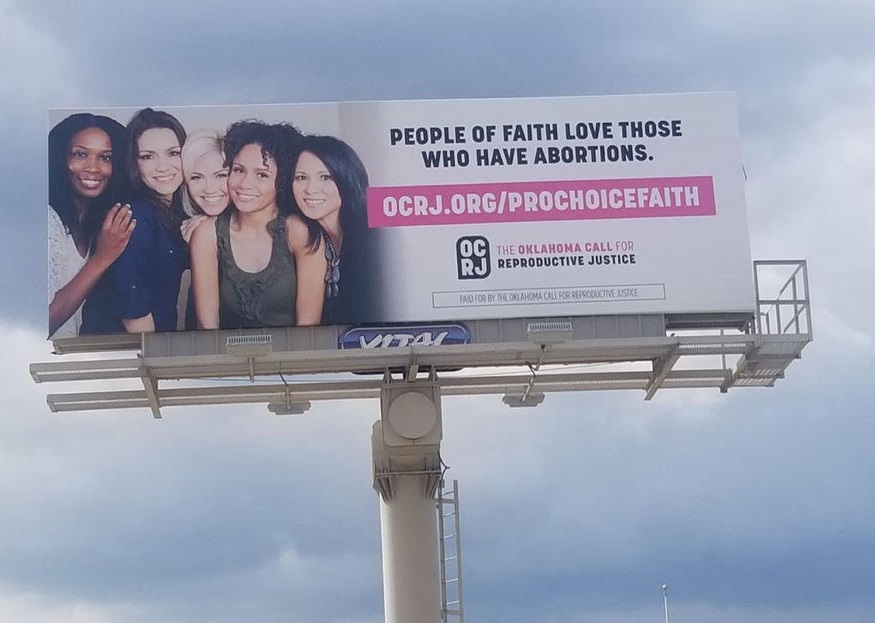
Did you know that Truthout is a nonprofit and independently funded by readers like you? If you value what we do, please support our work with a donation.
The Rev. Sheri Dickerson says supporting reproductive justice is among her faith’s most critical callings.
Dickerson is one of many faith leaders involved with the Oklahoma Call for Reproductive Justice (OCRJ), an all-volunteer grassroots organization based in Oklahoma City dedicated to reproductive justice education and advocacy. Last week OCRJ launched a high visibility billboard campaign to show support for abortion rights among people of faith.
“I feel as someone who is part of the faith community that it is part of my mission and calling to be a voice and an advocate for reproductive justice, especially but not exclusive to abortion care,” Dickerson said. “Anti-abortion advocates are very outspoken, and so I think it is crucial and necessary for those of us who are part of a faith community and leadership that we counteract that by being vocal in our support for people to have abortions.”
The campaign includes eight billboards north and south of Oklahoma City, near Stillwater, Edmond, Marlow, Chickasha, and Newcastle, as well as radio spots and online ads. The billboards read: “People of faith love those who have abortions,” and “God loves those who have abortions.”
Billboards were chosen as part of this campaign to reach people in more rural parts of Oklahoma who might not otherwise receive the message, said Emma Newberry-Davis, spokesperson for OCRJ.
“What we really like about using billboards is making a bold public statement. We really wanted to change the narrative around abortion and faith,” Newberry-Davis said. “During the legislative session there is always some legislator who brings up their faith, and that they are anti-choice because of their faith. But we know there are people who are pro-choice because of their faith, not in spite of it. We wanted to flip the narrative because I think the standard here is that those things are diametrically opposed.”
Newberry-Davis said the billboard campaign is designed to counteract the stigma and shame surrounding abortion care and push back against the abortion restrictions pushed through by the state GOP lawmakers. Oklahoma is one of five states with a forced 72-hour waiting period between a state-directed counseling session and an abortion procedure. Oklahoma law requires parental consent for a minor to obtain abortion services, prohibits the use of telemedicine to administer medication abortion, and bans insurance coverage for abortion unless a person’s life is endangered or they have purchased an optional rider at an additional cost.
The Oklahoma billboard campaign is similar to initiatives elsewhere aimed at de-stigmatizing the common medical procedure. In August, the Abortion Care Network sponsored a billboard campaign in Northern California to counteract anti-choice pregnancy centers and educate the community about where people can access nonjudgmental information about an unplanned pregnancy. Five billboards went up in Sacramento and Fresno—areas where anti-choice pregnancy centers are set up near independent abortion providers.
These anti-choice pregnancy centers, often staffed by anti-choice activists, masquerade as abortion providers and attract patients with offers of free pregnancy tests, but most deploy misinformation to dissuade people from seeking abortion services. Federal and independent investigations have caught staff at these facilities misleading patients, exaggerating the risks of abortion, and delaying care.
Ohio-based abortion provider Preterm launched a billboard campaign in January with the goal of de-stigmatizing abortion care and lifting up positive messages about how abortion has improved people’s lives. Sixteen billboards in and around Cleveland displayed the message “Abortion is ______,” with a different word or phrase filling in the blank, like “a second chance,” “health care,” and “life-saving.”
“Abortion stigma is everywhere. In medical institutions, in our community, even among people who have abortions, and the only way we can ever hope to overcome stigma is to talk about it,” said Chrissie France, Preterm’s executive director. “One in four people will have an abortion in their lifetime. We need to talk about it. It’s not this horrible secret thing.”
The OCRJ campaign in Oklahoma also includes ads on the radio and on social media and search engines, while anti-choice clinics use Google to trick those searching for reproductive health care services. The billboards will remain up through mid-October.
Dickerson said she hopes the campaign will reach people who need to hear the message that being a religious person who needs abortion care is not a moral failing.
“In the Christian faith, one of the things we are called to do is treat others the way you want to be treated and that is with love and mercy and grace,” she said. “We need to show that we are proud to publicly express that love and support and to hopefully remove some of the anxiety or concern for people who need to make that choice. I want them to know that we are faith-based and supportive.”
Trump is silencing political dissent. We appeal for your support.
Progressive nonprofits are the latest target caught in Trump’s crosshairs. With the aim of eliminating political opposition, Trump and his sycophants are working to curb government funding, constrain private foundations, and even cut tax-exempt status from organizations he dislikes.
We’re concerned, because Truthout is not immune to such bad-faith attacks.
We can only resist Trump’s attacks by cultivating a strong base of support. The right-wing mediasphere is funded comfortably by billionaire owners and venture capitalist philanthropists. At Truthout, we have you.
We’re in the midst of a fundraiser, and as of right now, we have until midnight to raise $10,000. Please take a meaningful action in the fight against authoritarianism: make a one-time or monthly donation to Truthout. If you have the means, please dig deep.